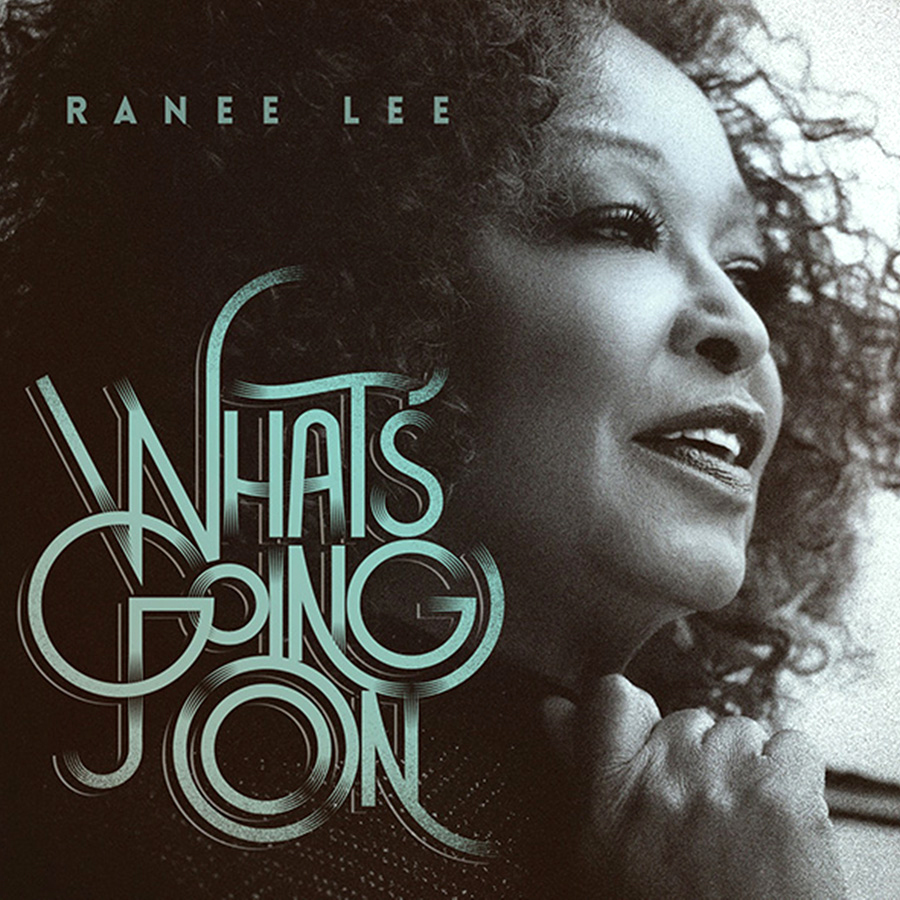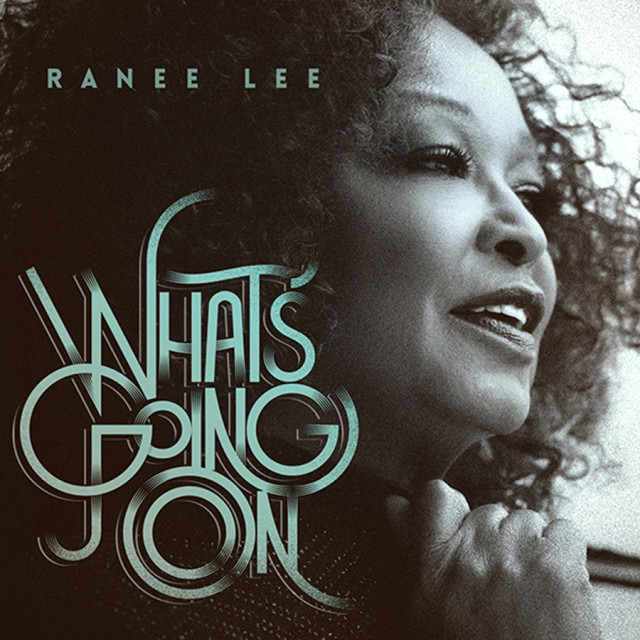Album review by Neil Hobkirk
Just a few seconds in, the strings are what strike you. They’re in fact the masterstroke that invests Ranee Lee’s new record with a sense of adventure.
Embarked on her eighth decade and laden with honours including the Order of Canada, Lee eludes the fetters of that respectful yet constricting label, “an institution.” An established fixture in Canadian jazz, and particularly in Montreal where she has carved a deep niche as performer and recording artist, actress and educator, Ranee Lee is no ossified elder stateswoman. As her new release dazzlingly affirms, this singer soars far above the cautious procession where countless fellow institutions sit gridlocked. With its savvy balance of unexpected covers and strong original repertoire, and its inventive deployment of string players, What’s Going On boldly sustains her anti-complacent trajectory.
Ranee Lee the recording artist has been active for exactly thirty years. Debut album Live at the Bijou (1984) emerged among the earliest releases from Montreal’s reliably independent Justin Time Records. Twelve albums later, Lee has never recorded for another source, a loyalty shared with Montreal pianist Oliver Jones, whose own debut furnished the label’s inaugural release. Of the two dozen discs issued so far by Jones on Justin Time, his co-led date with our vocalist surely counts among the strongest. Just You, Just Me (2005) stands equally as a highlight in Ranee’s output, an exemplum of musical friendship and fellowship, unity of approach and diversity of repertoire. In 2010, a Juno Award met Ranee Lee Lives Upstairs, a quintet date captured live at Upstairs in Montreal. Capitalizing on a different partnership, that album featured husband Richard Ring on guitar.
What’s Going On completes a remarkable late-period hat trick, to my mind Lee’s three finest records. Adventurous choices distinguished Lives Upstairs, where the singer assayed lyrics superadded by Samantha Moore (to Pat Metheny’s “A Crooked Road”), Jamie Cullum (to Johnny Mandel’s “A Time for Love”) and Jon Hendricks (to Eddie Vinson’s “Four”). On the new album she tackles Hendricks’ vocal part for “I Mean You” (Thelonious Monk). Ranee races through this tune, dispatching it with abandon while retrofitting it with Latin American rhythm. This sheer audacity pays off, imparting a festive nonchalance to Monk’s jagged song structure. Rising tenor sax star Chet Doxas rides the melody manfully, augmenting the album’s basic instrumental configuration: guitar/piano/bass/drums. Taurey Butler’s on piano here, intrepidly channeling Thelonious with a strong left hand. Bass duty belongs to Dave Watts, who yields to Morgan Moore on five of the record’s ten tracks. Butler and pianist Chad Linsley likewise claim five tracks each. Richard Ring mans electric guitar throughout, while the guy adding cowbell here is Dave Laing, the session’s sole drummer.
There’s of course no need to stress the gender of Ranee’s sidemen, except possibly when the strings step in. The string quartet she and co-producer (and label founder) Jim West have enlisted is female and, judging from the digipack’s tiny artist photo, youthful. In any case, the members of Birds on a Wire impart a palpably fresh sensibility to their six appearances on What’s Going On. I’ve heard strings interact with jazz musicians on countless recordings, but seldom so vividly—in fact, vivaciously—as here.
The sidewomen work their magic almost immediately, levitating the eponymous Marvin Gaye opener after Ring’s initial statement. In the original Motown single, an expression of incredulity in the face of violence, Gaye encouraged peaceful coexistence. Ranee Lee’s treatment of the lyrics sounds similarly forgiving, though more impassioned. With hers the sole voice, Birds on a Wire are free to fill the space occupied by backing vocals on the original. There the strings were diffuse in effect, providing atmospheric background; here, on Lee’s redo, they command the foreground alongside singer and sidemen. A closely miked foursome, these strings moreover sound keenly individuated: violins, viola and cello exult in the warmth of their own voices, complementing Ranee’s robust delivery. Andy Ballantyne wrote the record’s resourceful string quartet arrangements, and he leaves ample space for all the musicians to cohere, improvise, contrast and interact. At twice the length of the Marvin Gaye original, “What’s Going On” accommodates tasty solos from bass and guitar. Morgan Moore’s double bass is particularly well captured by recording engineer Tim Gowdy, its woody timbre delightfully resonant. David Laing’s drums likewise register richly, conveying Bernard Purdie-worthy backbeat.
This opening tour de force is balanced on the album by the second-last track, Bob Marley’s comparably iconic “One Love.” The string quartet carries Marley’s message aloft, supported by vocals from three of Lee’s grandchildren. Her own strongly declarative singing and Ring’s enthusiastic six-string wailing make this tune a joyful family affair. Along with another buoyant bass solo from Moore, Chad Linsley’s serene piano comping ratifies this paean to universal love.
What’s Going On closes with Leon Russell’s much-covered “A Song for You,” delivered as an emotional showstopper. A lover’s tortured apologia in the wake of estrangement, the ballad benefits from Ranee Lee’s big, dramatic reading. In comparison, the composer’s own delivery sounds merely petulant (Leon Russell, 1970). Ranee’s persuasive case gains sympathetic support from her husband’s blues-drenched soloing and the strings’ swirling ministrations.
The singer makes an equally strong case for her own three compositions, none of them arranged to include strings. “Echoes of the Heart” bears some resemblance to the standard “Autumn Leaves,” albeit an uptempo version. Lee and her band swing vigorously here, with Dave Watts’ walking bass providing an urgent pulse throughout. The two vocal sections bookend incisive solos from the other instrumentalists: Laing, Ring, Butler and, in his other appearance, Chet Doxas. This generous allotment of space to her players recalls Ranee’s appearance at the 2010 Prince Edward County Jazz Festival in Picton, Ontario. From that show I recall the sheer magnetism of her stage presence and the powerful versatility of her voice—Ranee was presenting Dark Divas, her tribute to seven revered black female jazz singers—but also the freedom she conferred upon members of her little big band. Under the music direction of Richard Ring, these A-listers including Alex Dean, Chase Sanborn, Kelsey Grant and Mark Kelso took turns stepping up to the plate, nailing solos that ignited fireworks but also advanced Lee’s musical narrative. (On YouTube you can watch her interact with a bigger band, L’Orchestre national de jazz de Montréal, conducted by Christine Jensen. Marianne Trudel plays piano.)
“It Will Be What It Will Be!” further establishes how naturally Ranee Lee commands the spotlight; she never effortfully hogs it. Her persona on this swaggering original is deeply authoritative as she counsels us to own up to our effects on the world. The advice is impossible to ignore, despite distractingly strong solos from Laing, Butler and Ring. “Silent Tears” too benefits from Lee’s marvellous lyric writing and liberally showcases her band. This midtempo original movingly narrates a woman’s quiet inner battle against quotidian adversity. Musically, such silent strength faces a mounting challenge from forces of extroversion: as the story unfolds, Laing’s flailing grows frenetic and Butler’s roiling chords turn clamorous, giving way to a full-born piano solo. Ring takes his turn on guitar, then things grow more fraught still as Laing and bassist Watts solo simultaneously. But Ranee Lee gets the last word(s): “Resolved in her silence, the task set before her, / There’s nothing to do but go on. / Behind every tear is the possible prayer / Where the silence takes leave from despair.” These lines’ inherent sense of conviction, and the strength of the pipes singing them, hammer home the value of perseverance.
The remaining tracks benefit from the commitment of Birds on a Wire. Arranged again by Andy Ballantyne, the string quartet equips Johnny Mandel’s “Where Do You Start?” with a cool, urbane backdrop. Alan and Marilyn Bergman’s contemplative lyrics lead Ranee to dip into her lower range, unlocking extra emotion in this long, slow love song. In a masterstroke within a masterstroke, Birds on a Wire are pared down to their viola player for the Moross-Latouche standard “Lazy Afternoon.” Rebecca Gans’ umbrous tone, vibrantly caught by Gowdy’s mics, carries seductively across the pastoral scene limned by Ring’s patient fretwork and Lee’s languid delivery. Likewise, solo cello embellishes “White Gardenia” (which you can hear, along with Lee’s three originals, in a Justin Time sampler on YouTube). Titled after the flower Billie Holiday favoured for her hair, the number comes from Roger Peace’s biographical stage show about the singer. Kathleen de Caen’s bowed notes darkly punctuate this account of lost love, leaving an ellipsis after the final words: “I’ll be all alone.” One hundred years after Lady Day’s birth, Ranee Lee will star in White Gardenia: The Billie Holiday Musical in Montreal in March 2015.
Editor’s note: This recording is recommended, and Wall of Sound encourages its readers to buy from a local, independent record store whenever possible. If you have no local option, please consider supporting our website by ordering from Amazon using our Affiliate link: Ranee Lee – What’s Going On. Thank you!



3 Replies to “Ongoing Adventure: Ranee Lee’s “What’s Going On” (Justin Time, 2014)”